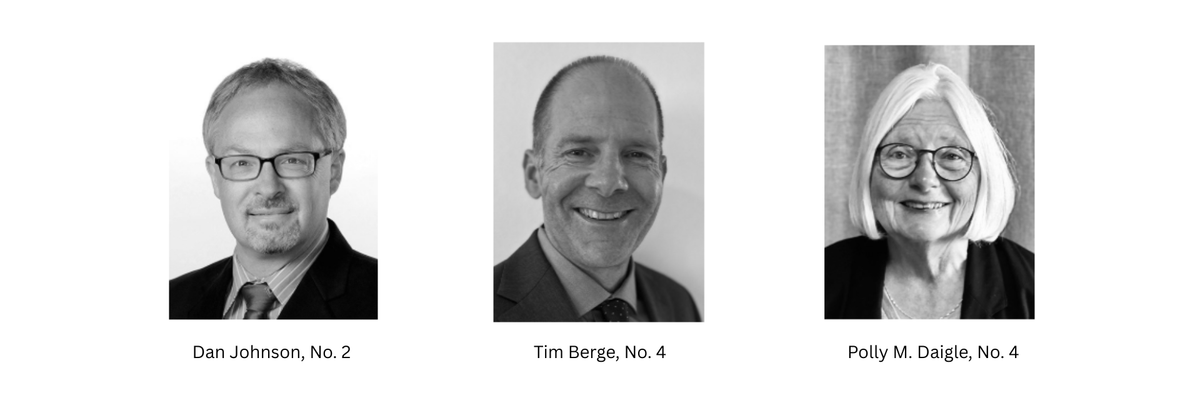
For Other Published Responses to date:
Questions:
--Are there any specific water quality trends that you are concerned about and if so, what are your strategies on how to address these issues?
--Are there water scarcity concerns for the Highline Water District and if so, what are specific ways they will be solved if you are elected?
Below are the questions and the non-edited response from candidates.
Dan Johnson, Highline Water District Commissioner Position #2, (unopposed): No response received.
Tim Berge, Highline Water District Commissioner Position #4: No response received.
Polly Daigle, Highline Water District Commissioner Position #4:
“Before I begin, it’s important to note that as your current (and hopefully re-elected) Highline Water District Commissioner, my role, along with that of our four other commissioners, is to discuss, set, and oversee District projects and policy. I’m fortunate to work with a professional, capable team of employees who are dedicated to serving our customers and maintaining affordable rates. The District’s progress and success have been a team effort, not the work of a single commissioner.
Question #1: Are there any specific water quality trends that you are concerned about, and if so, what are your strategies to address them?
During my six years as Commissioner, one of our most pressing concerns was the discovery of PFAS—often called “forever chemicals” at our Tyee well site. Out of an abundance of caution, we immediately suspended operation and took the well offline in alignment with public health guidelines. This issue was discovered through our proactive testing and monitoring program which exceeds minimum regulatory requirements and reflects our ongoing commitment to protecting public health and trust.
We have also been fully engaged with the latest federal revisions to the Lead and Copper Rule, which required Highline Water District (HWD) to identify any remaining lead service lines throughout the system. With over 19,000 service connections, this was a significant undertaking. Using a combination of record reviews, age assessments, and field inspections, our crews determined the material type for every remaining line. I’m proud to report that no lead service lines were found within the District. We will continue to verify line materials as replacements occur to ensure ongoing safety.
These are just two examples of how HWD responds to emerging water quality challenges. As a Commissioner, I am committed to using the latest technology and ensuring our water quality staff receive the highest level of training and support.
For more information about our water quality, I encourage residents to read our most recent Consumer Confidence Report (CCR) available at: https://highlinewater.org/202/Consumer-Confidence-Report-CCR.
My top priority remains providing safe, clean, reliable, and affordable water for all HWD customers—today and for generations to come. I am proud of the work our staff and fellow commissioners are doing and remain committed to being truthful, responsive, and fully accountable to the community we serve.
Question #2: Are there water scarcity concerns for the Highline Water District, and if so, what are specific ways they will be solved if you are elected?
While Highline Water District is not currently experiencing a water shortage, population growth and climate change require careful planning for the future. Our region’s primary reservoir is Mt. Rainier, where winter snow-pack melts gradually to supply rivers, lakes, and aquifers through spring and summer. Reduced snow-pack means less downstream water available for households, businesses, and ecosystems alike.
Approximately 75% of HWD’s water supply is purchased from Seattle Public Utilities (SPU). Earlier this year, we finalized a long-term agreement guaranteeing our water purchase rights for the next 40 years. In addition, HWD is working with Lakehaven Utility District to install a new intertie connection, creating a shared emergency and supplemental supply link. Combined with our active wells, this gives us three separate and reliable water sources.
Preserving our current supply is equally important. HWD invests heavily in system maintenance, leak detection, and main replacements to minimize water loss. I also actively promote planning for climate resilience, which includes expanding storage capacity, building redundancy into our network, and preparing for drought conditions before they occur.
Community participation plays a vital role as well. Adopting drought-tolerant landscaping, fixing household leaks, and using water-efficient appliances all contribute to sustainability.
To learn more about how residents can help conserve water, visit: https://www.highlinewater.org/200/Conservation.”
Are you a local elected official or candidate running for office?
Want to Submit another answer to a Reader- submitted question? Or Answer Next Weeks Question?
Submit Your Own Question to a Candidate!
Highline Journal Comment Guidelines
We believe thoughtful conversation helps communities flourish. We welcome respectful, on-topic comments that engage ideas, not individuals. Personal attacks, harassment, hateful comments, directed profanity, false claims, spam, or sharing private information aren't allowed. Comments aren't edited and may be removed if they violate these guidelines.